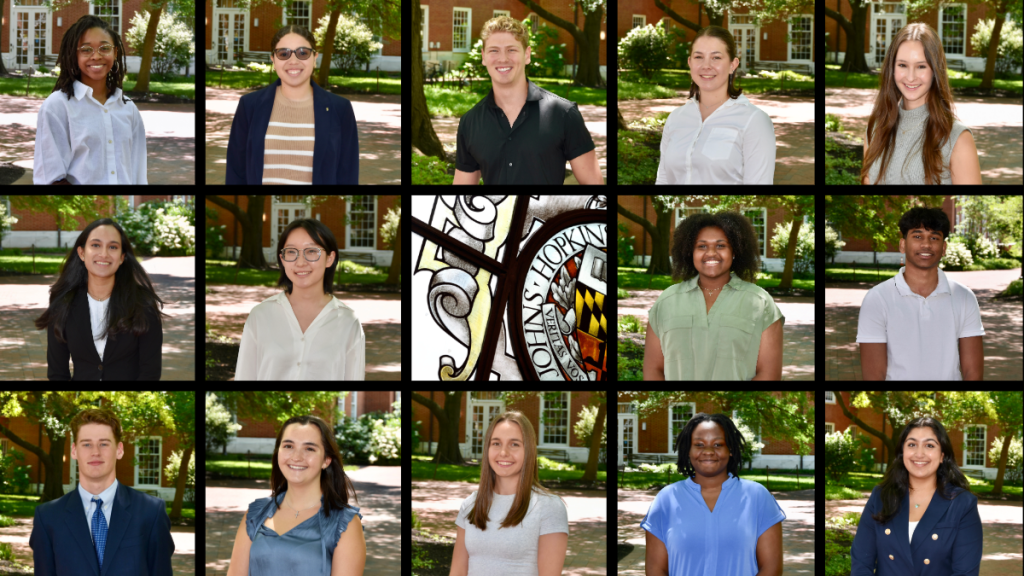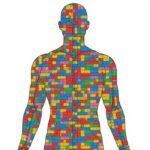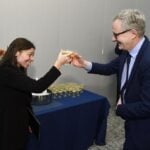Meet our Summer 2024 Undergraduate Student Researchers

Above photo. Top row from left to right: Alana Canty, Alana Villar, Leo Rocha Munguba, Cristiana Martinez, and Elizaveata Borroum. Middle row from left to right: Ishika Nag, Claire Hwang, Gabrielle Reynolds, and Harsha Rajkumar. Bottom row from left to right: Tanner Baughman, Ella Wallace, Emily Bubonovich, Hope Omoniyi, and Neha Shahrawat.
Every summer for 14 years, the INBT welcomes undergraduate students in the Nanotechnology for Biology and Bioengineering Research Experience for Undergraduates (REU) program. Students spend 10-weeks with INBT faculty and mentors heavily engaged in research projects ranging from developing cancer therapies and diagnostic tools to using regenerative engineering to heal the body. They also participate in professional development training, networking activities, and explore Baltimore and other surrounding cities.
Meet our student researchers, learn about their projects, and follow them on social media.
Home university: Old Dominion University, Norfolk, VA
Faculty mentor: Robert Ivkov
Graduate student mentor: Hayden Carlton
Research project: Alana Canty is characterizing the performance of manganese ferrite nanoparticle solutions for the purpose of optimizing magnetic particle hyperthermia and imaging treatments.
Social media: Follow Alana on LinkedIn.
I look forward to growing personally and professionally during my time here in the program by gaining new perspectives, being exposed to diversity, and building relationships.
Home university: University of Massachusetts Amherst
Faculty mentor: Soojung Claire Hur
Graduate student mentor: Hyun Woo Sung
Research project: Alana Villar is using microfluidic devices to deliver genetic material into cells. Research on microfluidic devices provides the opportunity to enhance and personalize patient care through more efficient cell sorting processes, such as with cancer cells in the blood and through therapeutic gene delivery.
Social media: Follow Alana on LinkedIn.
Through this experience, I hope to delve thoroughly into an interesting area of research that will expose me to new ideas and ways of thinking, challenge me to develop critical research skills, and allow me to leverage my reasoning and creativity so that I may ultimately leave here a more robust scientists prepared to contribute to further research and repay forward the opportunity I have been given here.
Home university: University of South Florida
Faculty mentor: Sangmoo Jeong
Graduate student mentor: Jeongyun Kim
Research project: Leo Rocha Munguba is using nanoparticles to engineer a personalized point-of-clinic molecular sensing system for diabetic retinopathy, the leading cause of blindness in working-age adult. This disease is caused by many factors that vary from patient-to-patient. The sensing system will assist physicians in designing personalized treatments based on each patients’ condition and needs.
Social media: Follow Leo on LinkedIn.
I hope to meet incredible people and conduct cutting edge research that is not being done anywhere else in the world!
Home university: East Tennessee State University
Faculty mentor: Kalina Hristova
Graduate student mentor: Tanaya Roy
Research project: Cristiana Martinez is studying membrane receptor structure, function, thermodynamics, and mutations. Specifically, she is studying receptor tyrosine kinases (RTK) and how ligand binding can affect downstream signaling.
Social media: Follow Cristiana on LinkedIn.
I hope to learn more about the graduate school applications, as well as, what it is like working in a biotechnology lab and all the applications it has.
Home university: University of California San Diego
Faculty mentor: Stavroula Sofou and Yannis Kevrekidis
Research project: Elizaveata Borroum is using reaction-engineering inspired models to analyze experimental data of drug delivery through multiple mechanism in cancer organoids. The goal is to use the model to optimize drug dosages and timing based on tumor size prior to animal modeling.
Social media: Follow Elizaveata on LinkedIn.
I hope to gain more experience working with additional professors and graduate students to get a better idea of what academic path is best for me.
Home university: Harvard University, Cambridge, MA
Faculty mentor: Peter Searson
Graduate student mentor: Ninghao (Eric) Zhu
Research project: Ishika Nag is creating 3D models of brain microvessels using tissue engineering and stem cell properties to better understand the blood brain barrier. This is aimed to improve drug delivery to the brain to treat diseases such as brain cancer.
Social media: Follow Ishika on LinkedIn and Instagram.
I want to step outside my comfort zone and stretch my mind by learning about new, revolutionary approaches that can help me thrive as a future bioengineer.
Home university: Cornell University
Faculty mentor: Jochen Mueller
Graduate student mentor: Daniel Ames
Research project: Claire Hwang is expanding the capabilities of direct ink writing on the microscale. By leveraging new nozzle designs, direct ink writing as a method of 3D printing can provide expanded horizons for the applications of 3D printing on the microscale.
Social media: Follow Claire on LinkedIn.
I’m excited to explore what it means to be an engineer in research and to have the opportunity to develop my interests in nanotechnology while working alongside world class researchers.
Home university: Harvey Mudd College, Claremont, CA
Faculty mentor: Jude Phillip
Graduate student mentor: LaDaisha Thompson
Research project: Gabrielle Reynolds is helping to develop a process to induce senescence and exhaustion in human T cells. With this information, she will examine their motility and if older cells are more vulnerable to cellular dysfunction. This research can be used to develop a biomarker for aging.
Social media: Follow Gabrielle on LinkedIn.
This opportunity will help me gain the skills necessary to advance my goal of working in the field of genetic disease detection. Immersing myself in Ph.D. level research and collaborating with fellow undergraduate students, graduate students, and professors allows me to witness firsthand the dedication and effort required to actively contribute to research.
Home university: Duke University
Faculty mentor: Efrosini Kokkoli
Graduate student mentor: Aditya Venkatraman
Research project: Harsha Rajkumar is studying how to encapsulate immunomodulatory compounds inside single stranded DNA nanotubes to treat glioblastoma. This research aims to enhance the delivery and efficacy of these compounds to improve therapies and patient outcomes for this aggressive brain cancer.
Social media: Follow Harsha on LinkedIn.
During the program, I hope to gain hands-on experience in cutting-edge nanobiotechnology research, build lasting relationships with peers and mentors, and develop a deeper understanding of interdisciplinary teamwork and translational medicine.
Home university: Ohio Northern University, Ada, Ohio
Faculty mentor: Denis Wirtz
Graduate student mentor: Vasco Queiroga
Research project: Tanner Baughman is using cell biology and immunotherapy to target cancer precursor lesions with immune cell therapies. This includes preparing cells for official clinical trials.
Social media: Follow Tanner on LinkedIn.
I hope to further my biological laboratory skills, explore Baltimore, and make connections at Johns Hopkins, which is such a highly influential university.
Home university: Washington and Lee University, Lexington, VA
Faculty mentor: Konstantinos Konstantopoulos
Graduate student mentor: Alice Amitrano
Research project: Ella is studying how fluid viscosity, that is the thicknesses of a fluid, affects how stem cells develop from a generalized cell to a specialized one. This information provides insights on how stem cells behave in the body. Additionally, Ella Wallace is studying how confinement effects cancer cell migration, which gives researchers a better understanding of cancer metastasis.
Social media: Follow Ella on LinkedIn.
I hope to master various laboratory procedures and skills, including gel formation, making media, qPCR, and more. Additionally, I hope to further my ability to communicate scientific findings into a condense and simple discussion so a wide range of audiences can understand my research.
Home university: College of the Holy Cross, Worcester, MA
Faculty mentor: Denis Wirtz
Graduate student mentor: Victoria Duarte Alvarado
Research project: Emily Bubonovich is developing a new treatment for rheumatoid arthritis by engineering immune cells that reduce symptoms and improving joint health. This could lead to more effective therapies that offer greater, long-term relief to people suffering from this disease.
Social media: Follow Emily on LinkedIn.
During the program, I hope to gain extensive hands-on lab experience, learn more about the cutting-edge projects, and develop a deeper understanding of what pursuing a PhD entails, including the challenges and rewards of advanced research.
Home university: Illinois State University, Normal, IL
Faculty mentor: Ashley Kiemen
Graduate student mentor: Valentina Matos
Research project: Hope Omoniyi is developing a computer model that looks at precancerous cells of the pancreas, called panin, and how they change with age.
Social media: Follow Hope on LinkedIn.
This is my first research experience and I am very grateful to have this experience at such a prestigious institution. I hope to make the most of this opportunity, I want to experience everything Johns Hopkins has to offer.
Home university: Georgia Institute of Technology
Faculty mentor: Honggang Cui
Graduate student mentor: Jinpyo Seo
Research project: Neha Shahrawat is developing long-acting hydrogel injectables to improve the delivery of HIV and Hepatitis B antiretroviral therapies. Hydrogels made from self-assembling drug amphiphile provide long-lasting therapeutic release of drugs in the body, requiring less frequent dosing and increase patient adherence to their treatment regimen, which are the biggest problems HIV and Hep B patients face today.
Social media: Follow Neha Shahrawat on LinkedIn.
I hope the program helps me gain awareness of current healthcare issues. Additionally, I want to understand how to engineer solutions with nano-biotechnology in the laboratory and through collaboration with leading experts in the hopes of making innovative advancements towards solving these problems.
Latest Posts
-
 Cellular building blocks may enable new understanding of the body’s “machinery”
December 19, 2025
Cellular building blocks may enable new understanding of the body’s “machinery”
December 19, 2025
-
 Biomedical Engineer Jamie Spangler Receives President’s Frontier Award
December 15, 2025
Biomedical Engineer Jamie Spangler Receives President’s Frontier Award
December 15, 2025
-
 Johns Hopkins Postdoc Named in Forbes `30 Under 30′ List
December 8, 2025
Johns Hopkins Postdoc Named in Forbes `30 Under 30′ List
December 8, 2025


